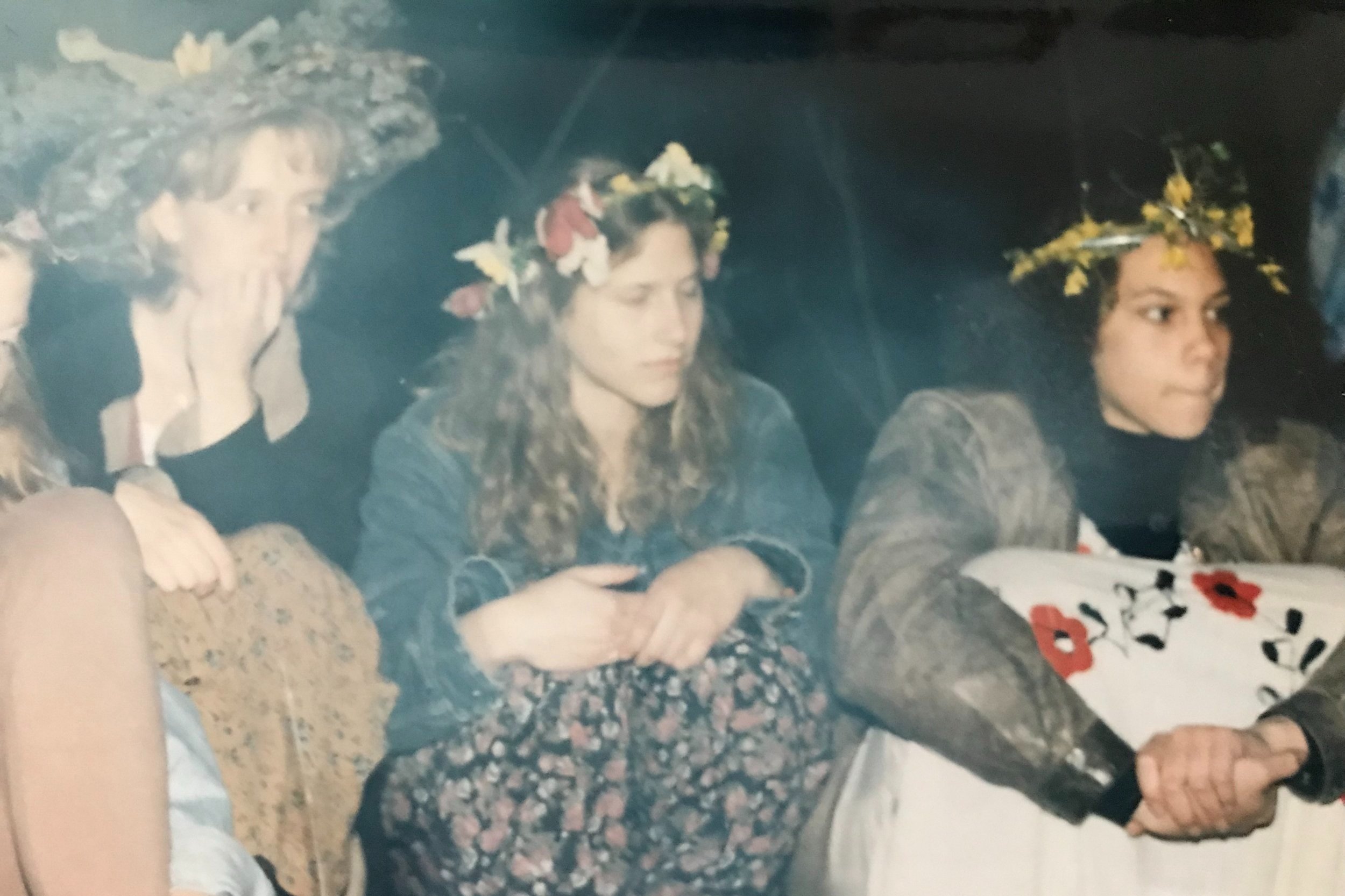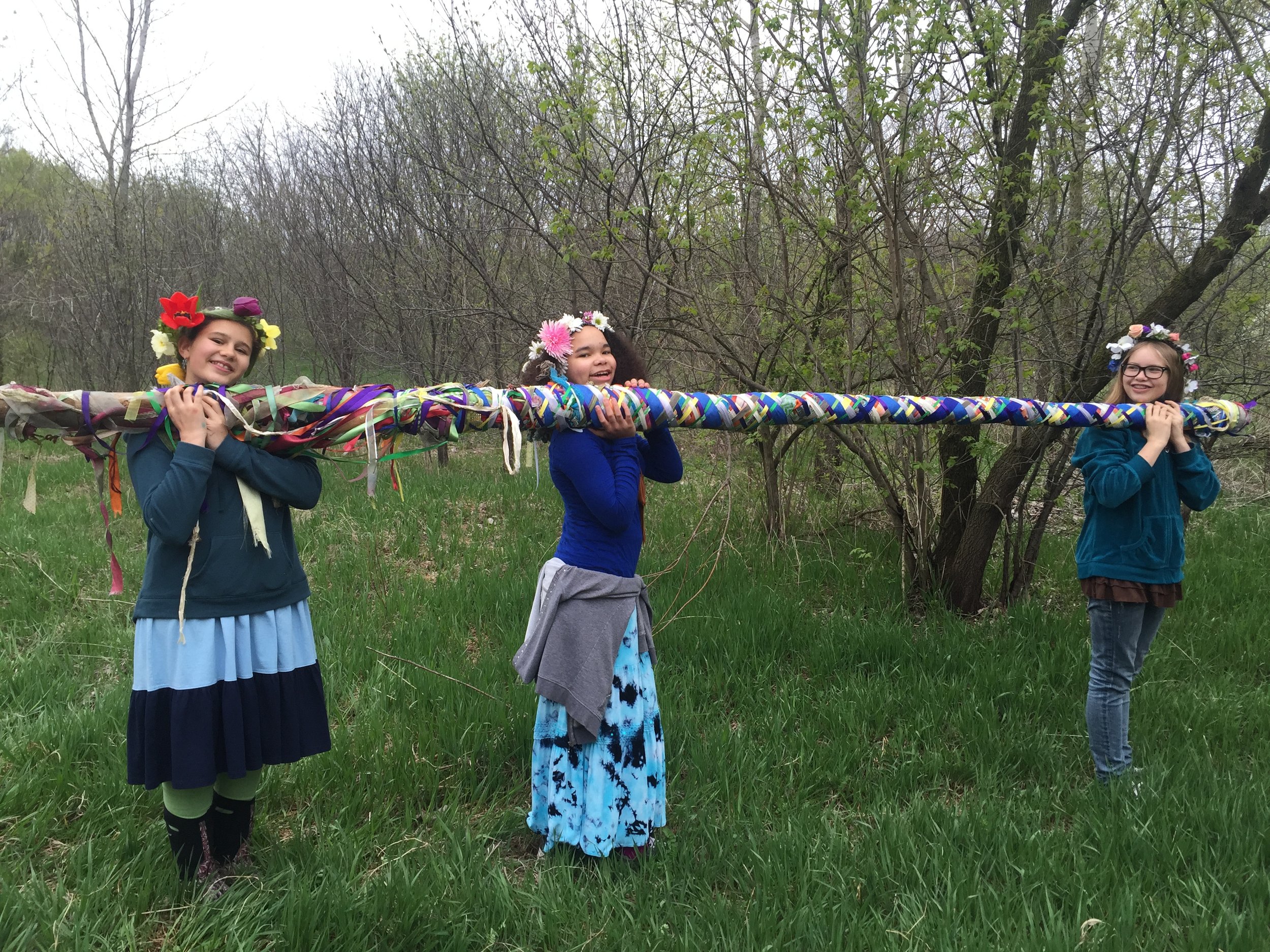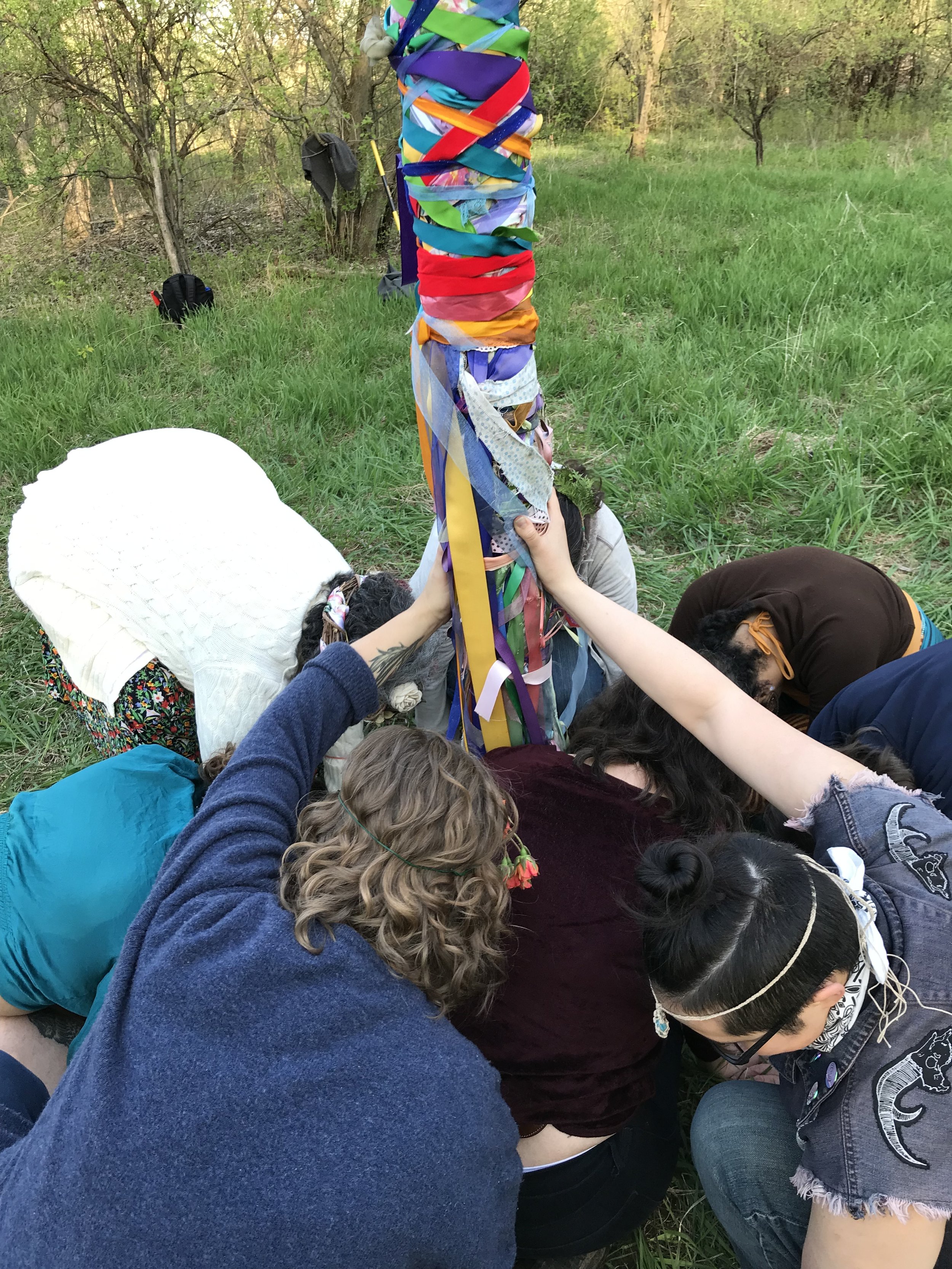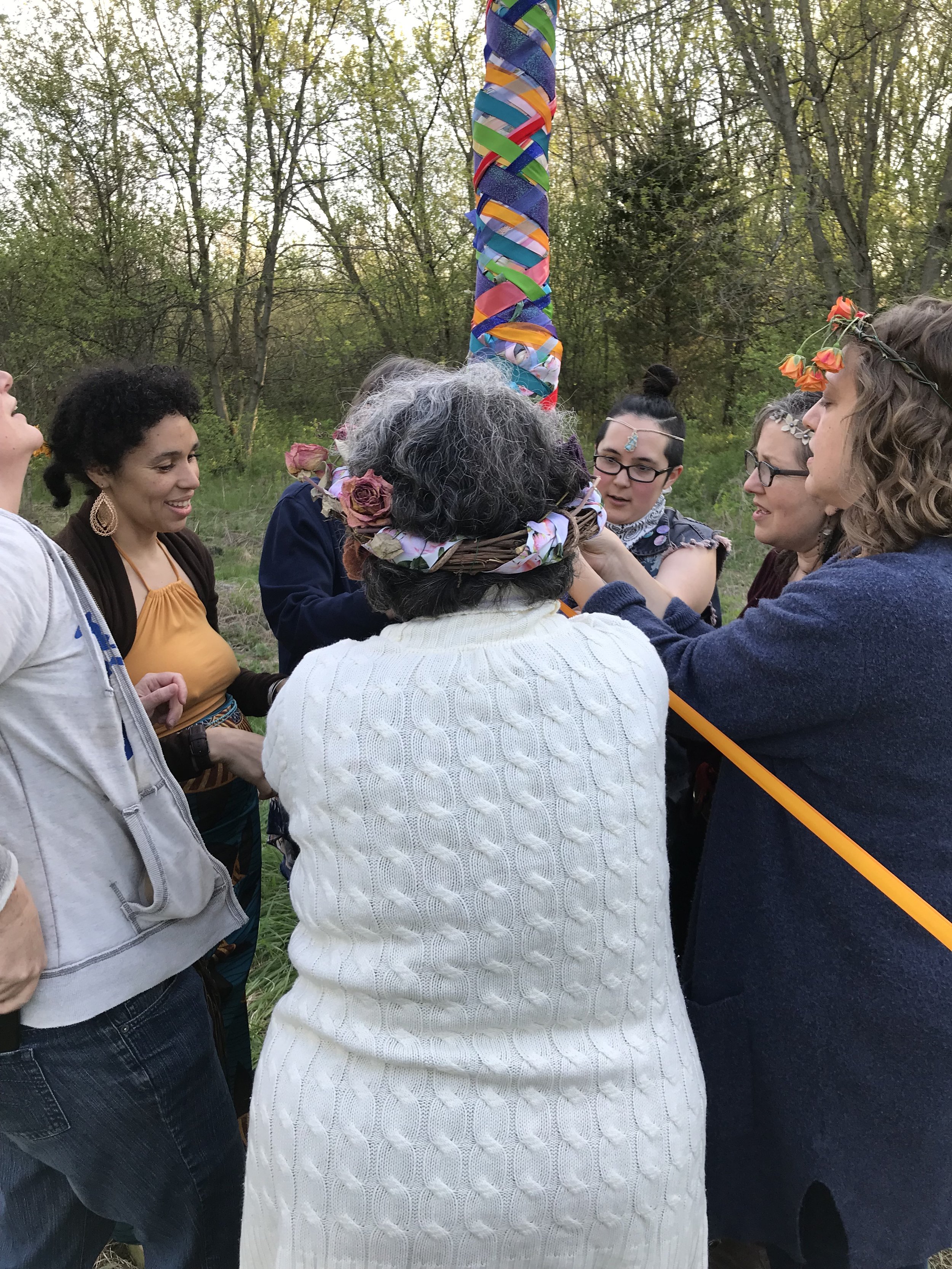What Traditions Will Survive? - Making and Keeping a Collective Promise
/I am offering this throwback to the start of the pandemic and some of the many questions it posed for us as a community. I am proud of the work we are doing to love each other and the earth, stretch deeply in our community care, and bring our traditions more closely into alignment with our values and prayers for the future.
It is the first of May, 2020 and I am in deep contemplation. This is traditionally a holy day and a holy tide for me and it has been for a lifetime. Yesterday, or today, or some time in this ancient traditional five day period called a “tide” my people and I would weave the Maypole and jump the fire. It is a fun and simultaneously reverent and irreverent seasonal celebration, but it is also something much more than it seems on the surface. For my ancestors it was an act of faith in the continuity of the rhythm of the seasons, and a humble offering of profound gratitude for all that the earth so generously gives.
When people live in genuine intimacy with the earth, there is no room for illusion about how deeply dependent we are upon her and there is no avoiding a state of absolute wonder over all that she is capable of, like all mamas or nurturers. In some ways our annual ritual pales in comparison to what our ancestors managed or how they lived, but at least it was a thread and an earnest effort to collectively remember and commit to an earth-honoring way. This year, that thread feels broken and my grief is shaking me. I didn’t see this coming and I am honestly stunned by the fact that this is one of those places where the pandemic is bringing up the most raw and vivid grief. It’s been forty years of this ritual for me. Generations of kids have come and gone learning this celebration with us. Our understanding of what community even is and what our guiding principles are have wildly evolved over the decades. I have gone from being a high school girl to being a grandmother, with all the births, deaths, and changes along the way, and still the ritual has persisted. I don’t have control over the things that I will grieve in this radical realignment that we are called to, but I do trust in grief as a powerful teacher and so I am listening, even through the panic and resistance.
What is it that feels broken or threatened that is sacred to me, and what do I truly miss? Communally-tended relationship with place. The touch of our hands on the earth. A moment of beautifully being a culture of common sovereignty. A dear friend and elder of mine, Myron Eshowsky, works deeply with refugees and trauma and recently shared with me that a big part of what people feel when they are displaced from their home is profound disorientation. Disorientation at the loss of something that in some ways they didn’t fully realize they had. Meaning, that relationship with place runs so deep, that we often cannot recognize the many ways it shapes and impacts us. We are made of our places and they are made of us and this is the fabric of life.
I believe that this is also true of tradition, especially tradition born of relationship with place. For me, the Maypole is a ritual of blessing and protection, because the earth needs our reverence and protection like never before. Not that I think for one hot second that she couldn’t swallow us whole as a species and get on with life if it came to that. I just don’t think that anyone, including the earth, really wants that. And so we have to realign our values and our actions, yesterday folks.
I stand here at this holy day, in 2020, while we are being reminded of our interdependence and vulnerability in a big way, and I don’t want this ritual in question. I am railing at the gods and feeling unsettled in my body. It would seem that no stone goes unturned, so today, instead of weaving, I am unraveling and I know that it is necessary. We are adapting, for this year, and beyond, I’m sure. For this year, in respect of everyone’s health and safety, a far smaller group of us will gather and bless this earth that we love without touching or getting too close. We will limit our numbers, don our face masks, use hand sanitizer and my bamboo garden stakes to steadfastly keep at least six feet between us. We will probably lay down on the earth and weep each in our own little “physically distant” world. I know I will. I have taken down the Maypole, from where it leans against my house every single year after weaving, leaned it on my fence so that I could reach it, wrapped my arms around it like a lost lover or child, and sobbed. There is a part of this process that I can’t find words for, but it feels like a promise, my promise to this earth, coming into question. That, I cannot live with. That I must address. So I ask, with puffy eyes and a tender heart, “What is there in our version of this tradition that needs to go?” I ask again “Beautiful mama planet, if my ability to love you as I long to, depends on the willingness to change, and to question everything, what needs to go? I lay these questions at your feet and promise to learn.”
Here is what I’ve learned for today, beloved people. I hope to god that every year after this we will be able to gather, dance the Maypole, pray and sing in honor of this gorgeous garden in space called earth, and… I know we’ll do it differently.
Some things I know we need to change are:
No more flowers for our crowns that come all the way from flippin’ Columbia, or California, or any other far-flung place, and end up at the grocery store, laden with either chemical pesticides, a hardcore carbon footprint, or both. Nada. So what does it look like to carry the tradition of May crowns forward without harming the earth? A simple crown made of Willow wisps? A few apple blossoms tucked into it? A handful of violets respectfully gathered right before the dance (or else they will have wilted)? It’s all slower, more gentle, requires more consciousness, and takes/asks far less from the earth.
No more ribbons made of anything other than natural, biodegradable fibers. The absurd violence of polyester comes to us courtesy of the petrochemical industry as a byproduct that is made into “material” in order to increase profit margins because they didn’t know what the hell else to do with it. WTAF?
I will probably still sob several times today over the hot damn mess we have landed ourselves in and for the absence of hands, touching hands, touching hands that all touch the earth in the Maypole dance. This has been the case for forty years of my life, and I will miss it, I am not divorcing all of it. I will grieve what is worthy of keeping that we’ll miss this year, but I sure as hell will not stay asleep to that which needs to change as we both stand at this crossroads and walk on down the road deciding what to leave our children.
In truth and beauty, and in a reimagining of culture, maybe Kathleen, or Lia, our resident competent weavers, will weave ribbon for the Maypole next year, starting soon, and we will compensate them with a weekly meal for their work? Maybe Zerah, who has a brand new baby in this madness and is talented with plant dyes, will offer a skill share and we can learn to call the colors forward from the earth herself that we weave into our Maypole, without harming her. If we’re lucky, we have the year to figure it out, along with food sovereignty, herbal remedy swaps, energy independence, and protection of tribal peoples and lands. We have a long way to go my friends, and today, one step at a time, I am grateful for grief as a teacher.
















